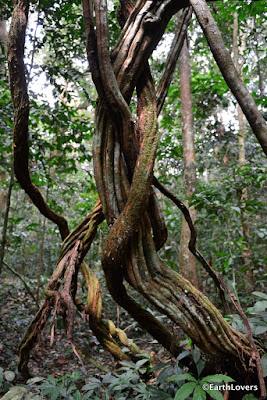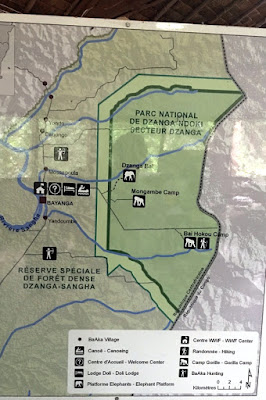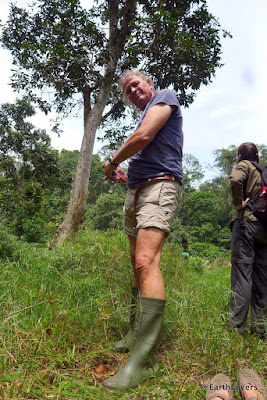 |
| In the Dzanga-Sangha at the Bai-Hokou base camp, starting point for the gorilla trekking Im Dzanga-Sangha am Eingang des Bai-Hokou Camps, Ausgangspunkt für die Gorilla-Trekking Touren |
 |
| Makumba, impressive silverback and boss of a group of western lowland gorillas Makumba, beeindruckender Silberrücken und Boss einer Gruppe Westlicher Flachland-Gorillas |
 |
| One of Makumba's offspring ... Einer der Sprösslinge von Makumba ... |
 |
| ... and two happy visitors ... und zwei glückliche Besucher |
A highlight in the Dzanga-Sangha Reserve is not just to observe the forest elephants, but to track gorillas, too. In other words: With a little luck we will encounter the western lowland gorillas! So, let's go.
With a rental car and driver we leave the Sangha Lodge early in the morning. About 35 km we have to go deep into the rainforest to reach the Bai Hokou Camp. Since the road conditions are pretty good, it takes us 'just' an hour and a half to get there. Bai Hokou is a base camp with a number of scientists studying the behaviour of the critically endangered apes. Two gorilla groups in the region are habituated, in other words used to being around people, and may be visited by tourists. We choose the smaller Makumba group, which has 14 gorillas, and an absolute rarity: twin babies. What a once in a lifetime experience this would be, to experience little gorilla twins in their natural habitat! That is why we start our gorilla tracking tour from Bai Hokou quite excitedly.
The trackers darken our hope
We follow our two Ba'Aka trackers together with Kate, a young WWF volunteer from the UK. They already have a rough idea of where to find the Makumba family, namely close to the camp, since every day after sunrise, a research team leaves the camp in order to look out for the current position of the gorillas, which is then communicated to the camp. The Ba'Akas and the three of us walk, sneak and creep quickly, determinedly and almost silently through the dense jungle. However, after a while the trackers darken our hope, as they start slowing down, looking around in confusion and then at each other in disbelief. What happened? The gorillas have moved on and their track seems lost.
 |
| Questioning faces. Where are the gorillas? Fragende Gesichter. Wo sind die Gorillas? |
 |
| We see just amazing tree trunks... Wir sehen nur beeindruckende Baumstämme... |
 |
| ... and old lianas. ... und alte Lianen. |
 |
| We have lost the track of the gorillas. Wir haben die Spur der Gorillas verloren. |
A lasting impression
However, the following will leave a lasting impression in our mind. Hence with a sharp eye and intense focus the Ba'Akas manage to get back on track. First we return a short while on the path we just came, then we go up and down, afterwards in big circles. It looks like we barely move forward, but we seem to be still back on track. Their orientation is just mind-blowing. We even do not notice that instead of finding the gorilla group quickly, we are already trekking for about two and a half hours. But suddenly our trackers' faces brighten up. We shall smell. Indeed, there is a scent of wild animals hanging in the air. The gorillas are very close.
And then finally we see them: Makumba, the silverback, and his family. Makumba means 'speed' in the local Ba'Aka language, and he really is a speedy one. As soon as he sits down, he is on the move again. His three females and the other group members are nearby, but not all are visible to us. The rainforest here is simply too dense, and we have to carefully follow our trackers in order to not spontaniously face a gorilla eye to eye.
 |
| Makumba, the mighty silverback, takes a short break, but then 😉! Makumba, der mächtige Silberrücken, macht eine kleine Pause. Aber dann 😉! |
The silverback runs towards us!
Then Makumba takes a short break, sits on the floor and leans against a fallen trunk. From a distance of about seven meters, we can watch this impressive silverback closely. His calmness, power and bravery are striking. All of a sudden, he jumps up and runs towards us. He then abruptly stops, stands still for some moments - which feels like eternity for us! -, turns around and goes away. Phew!
We spot the rare gorilla twins. Lucky us!
But where is Malui with her two babies? Queryingly I look at the Ba'Akas. They continue searching, and then we are just incredibly luckily. Deep in the bush we spot the mother with her twins, both clinging to her! We manage to take a short look at all three of them, even though it is alas not long enough for proper pictures. Such a touching moment. I am blessed!
Afterwards we have a lot of fun watching some juveniles playing and frolicking around. Our time with the Makumba family just flies by. Here, as well as in Uganda, Rwanda and the Congo, the viewing time with the gorillas is strictly limited to one hour. A regulation you sometimes would like to water down a bit on the ground, but which is absolutely necessary and useful to protect the animals.
We have countless unique pictures in our mind, yet only a few useful ones in the camera due to the poor lighting conditions in the thicket. Absolutely happy and satisfied we start our way back, just thinking again: What a wonderful day at Dzanga-Sangha!
Should you like more information about the protection of the endangered western lowland gorillas in the Dzanga-Sangha, please check e.g. here:
Dzanga-Sangha National Park: Western Lowland Gorillas
WWF: "First Twins Born to Habituated Gorilla Family in Central African Republic"
Berggorilla und Regenwald Direkthilfe e.V.: "First Twins..."
Dzanga-Sangha: Wir sehen Gorillas - und erleben eine absolute Seltenheit
Das Dzanga-Sangha Reserve bietet als Highlight nicht nur einen Besuch bei den scheuen Waldelefanten, sondern auch ein Gorilla-Trekking. Mit etwas Glück können wir also die Westlichen Flachland-Gorillas in ihrem natürlichen Lebensraum entdecken! Los geht's.
Frühmorgens verlassen wir mit Mietwagen und Fahrer die Sangha Lodge und fahren rund 35 km in den Regenwald hinein bis zum Bai Hokou Camp. 'Nur' anderthalb Stunden benötigen wir für diese Strecke, denn glücklicherweise sind die Wege in recht gutem Zustand. In Bai Hokou leben ständig einige Wissenschaftler, die das Verhalten der stark vom Aussterben bedrohten Menschenaffen erforschen. Zwei Gorilla-Gruppen in der Region sind habituiert, d.h. an Menschen gewöhnt, und können von Touristen besucht werden. Wir entscheiden uns für die kleinere Makumba-Gruppe. 14 Mitglieder hat sie, und eine besondere Rarität, nämlich Zwillings-Babies. Die kleinen Menschenaffen-Jungen in der Wildnis zu erleben, wäre natürlich ein absoluter Volltreffer! Besonders gespannt beginnen wir daher von Bai Hokou aus unsere Gorilla-Trekking Tour.
 |
| Site plan of the area - we are close to the Congo here. Standortplan - wir sind hier nahe an der Grenze zum Kongo. |
 |
| In the Bai-Hokou camp Im Bai-Hokou Camp |
 |
| Martin takes a little break, before ... Martin macht eine kleine Pause, bevor ... |
 |
| ... we start our trekking tour. ... wir unsere Trekking-Tour starten. |
Gedämpfte Erwartungen
Bleibender Eindruck
Was nun jedoch beginnt, wird einen bleibenden Eindruck bei uns hinterlassen. Mit scharfem Blick und äußerster Konzentration gelingt es den beiden Ba'Akas nämlich, die Fährte wieder aufzunehmen. Gemeinsam gehen wir ein Stück des Weges zurück, dann kreuz und quer, in großen Schleifen, uns kaum vorwärts bewegend - so erscheint es zumindest -, doch wohl stets auf der richtigen Route. Dabei knicken sie an Büschen öfter kleine Zweige ab und kratzen schnell irgendwelche Zeichen in den Boden. Selbst wenn wir an einer Stelle mehrfach vorbeikommen, erkennen sie an all den umgeknickten Zweigen noch immer, wo wir aktuell entlang gehen müssen. Ehrlich, das beeindruckt uns zutiefst! So realisieren wir auch gar nicht, dass aus der ursprünglich angenommenen kurzen Zeit bis zum Auffinden der Gorillas knappe zweieinhalb Stunden geworden sind. Doch auf einmal erhellt sich das Gesicht unserer Tracker. Sie deuten an, wir sollen einmal riechen. Tatsächlich. Ein strenger Geruch liegt in der Luft. Die Gorillas sind ganz in der Nähe.
Und dann sehen wir sie endlich: Makumba, den Silverback, und seine Familie. Makumba bedeutet in der Ba'Aka-Sprache 'Tempo', und das hat er wirklich. Kaum sitzt er, schon macht er sich wieder auf. Seine drei Weibchen und die anderen Gruppenmitglieder sind in der Nähe, doch für uns nicht alle sichtbar. Zu dicht ist der Regenwald hier, und zu sehr müssen wir darauf achten, unseren Trackern zu folgen und nicht plötzlich überraschend Auge in Auge vor einem Gorilla zu stehen.
Der Silberrücken läuft direkt auf uns zu!
Makumba macht dann aber doch eine kleine Pause, auf dem Boden sitzend und an einen umgefallenen Baumstamm gelehnt. Aus gebührendem Abstand von etwa sieben Metern können wir diesen imposanten Silberrücken intensiv beobachten. Wir sind fasziniert von der Ruhe, Kraft und Autorität, die das Familienoberhaupt ausstrahlt. Urplötzlich jedoch springt er auf und läuft in unsere Richtung. Dann stoppt er auf einmal, bleibt einen Moment lang stehen - eine gefühlte Ewigkeit für uns! -, dreht um und zieht von dannen. Puuh!
Wir sehen seltene Gorilla-Zwillingsbabies!
Aber wo ist nur Malui mit ihren beiden Babies? Fragend schaue ich die Ba'Akas an. Sie machen sich weiter auf die Suche, und werden auch diesmal fündig. Die Zwillings-Mama hält sich gut versteckt im Dickicht, das eine Junge auf dem Rücken, das andere am Bauch klammernd. Es gelingt uns trotzdem, einige Blicke auf die drei Menschenaffen zu werfen, auch wenn es für brauchbare Fotos leider nicht reicht. Was für ein berührender Moment. Ich bin selig!
Danach haben wir noch viel Freude dabei, mehreren Halbwüchsigen bei ihren Rangeleien zuzusehen. Und so vergehen die 60 Minuten mit der Makumba-Familie leider viel zu schnell. Ja, die Zeit bei den Gorillas ist hier - ebenso wie in Uganda, Ruanda und dem Kongo - auf eine Stunde begrenzt. Eine Regelung, die man vor Ort manchmal gerne aufweichen würde, die jedoch zum Schutz der Tiere absolut notwendig und sinnvoll ist.
Mit unzähligen einzigartigen Bildern im Kopf - aufgrund der schlechten Lichtverhältnisse im Dickicht allerdings nur wenig brauchbaren in der Kamera - machen wir uns überaus happy und zufrieden auf den Rückweg, und denken auch heute: Was für ein wundervoller Tag im Dzanga Sangha!
Mehr Informationen über das Schutzprogramm der bedrohten Westlichen Flachland-Gorillas im Dzanga-Sangha Schutzgebiet findet ihr z.B. hier:
Dzanga-Sangha: Westliche Flachland Gorillas
Berggorilla und Regenwald Direkthilfe e.V.: "Gorillazwillinge im Dzanga-Sangha"
FB-Page "Bai Hokou - Dzanga-Sangha Gorillas"
 |
| We are drinking fresh water from a little stream in the heart of the rainforest - ... Wir trinken frisches Wasser aus einem kleinen Fluss inmitten des Dschungels, ... . |
 |
| ... don't worry: it is crystal clear and clean 😛! ... keine Sorge: es ist kristallklar und sauber 😛! |
 |
| A late lunch snack at the Bai-Hokou camp Ein später Mittags-Snack im Bai-Hokou Camp |







Keine Kommentare:
Kommentar veröffentlichen